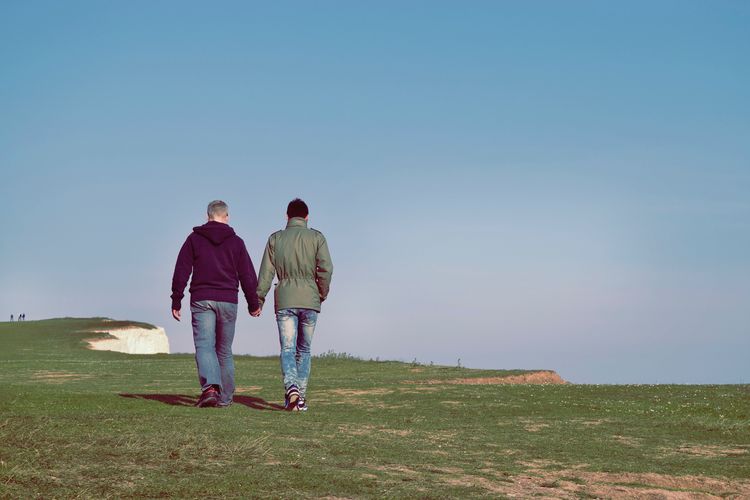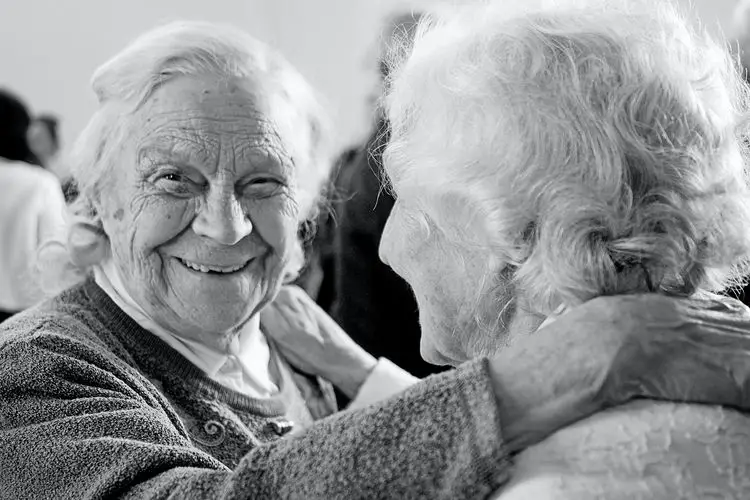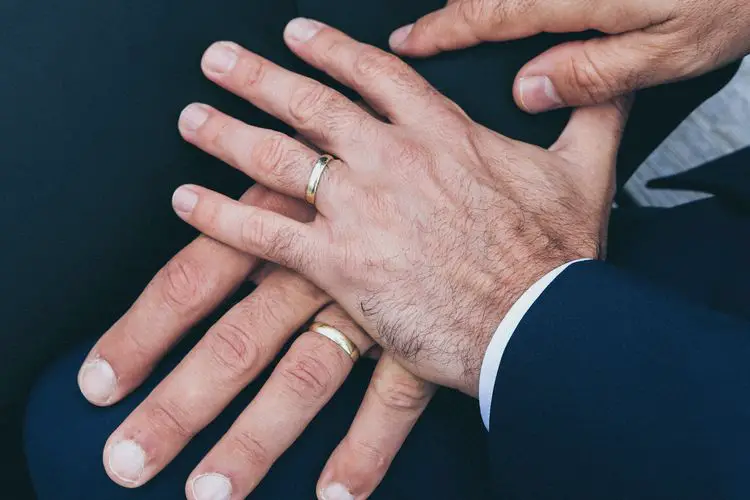
Coming out as gay can be difficult for anyone. You have a partner, you love them, and you want to introduce them to your family as someone who’s more than significant to you. They’re someone you’re sharing your life — and your bed — with. But what are the ramifications? Is your family accepting? Are they close-minded? What are your grandchildren going to think, when you change their view of you forever? Let’s take a look at the challenges and benefits of you as a senior citizen coming to terms with your homosexuality and what it means in the long run.
Coming Out as Gay: Challenges
Unfortunately, there is a sense of possible or actual loss, when it comes to “coming out” to your family.
Will I lose my kids?
Will I lose my grandkids?
There’s always that sense of sacrifice. But why is that? Why do we feel like we’re risking the love of our family members, when we come out as gay? As you know, the answer to that question spans generations and lifetimes of holding certain beliefs.
It can be something as simple as a snail-mail delivery. When the postal carrier sees the rainbow flag by your door, will they shake your package roughly? Will they not deliver it at all? Who in your life suffers from homophobia, and how will it affect your day-to-day existence?
More importantly, what reaction will your coming out elicit from your “tribe,” the ones you love and who are supposed to love you?
Gary’s Story
From this point forward, I’m going to use the real-life story of a gay man I know who came out as gay when he was 45. We’ll call him Gary. Some of the first things he had to contend with, before introducing his boyfriend to his family, were the views that different generations of his family had toward a person being homosexual.

Generational Views
Although of course opinions and beliefs differ widely among individuals, there do happen to be some generational differences when it comes to a relative coming out as gay. Our friend Gary, for example. On the same day he received a text from his sister saying, “You’re dead to me,” he also got a message from his niece saying, “Go get ’em Uncle Gary!”
As indicated in scholarly research, attitudes about gay rights have been changing in the past 30 years. Where before there was a brick wall that was barely worth beating your head against, now there is a general feeling that homosexual people, nonbinary people, trans-identifying people, are all worthy of the same basic rights and privileges as anybody else. And the same friendships and relationships.
More than anything else, this is a result of younger people gradually coming to comprise a greater proportion of the population at large. In other words, youngsters are taught by popular culture that people who are “different” are really the same as heterosexuals at heart, and that it’s okay to befriend someone who identifies as LGBTQ+.
But some people, despite the influence of movies, TV, and reasoned argument, are still old-school dead set against what they see as an aberration. Like Gary’s sister. Why did she condemn him?
The circumstances and realities of homophobia have been the subject of volumes. That means that many others have found themselves in Gary’s position. But that doesn’t make it any easier to bear the pain of a family member’s unacceptance of who you really are, when it comes to your choice of partners later in life. So Gary was left at a crossroads, with little information as to what would transpire should he go left or right. I spoke with him and found out what sources he turned to, in the search for acceptance.
LGBTQ Resources
The first thing Gary came across when he was looking for resources to help him through coming out as gay was this fact sheet from The National Resource Center On LBGT Aging. But, he says, it raised more questions than it answered. He’d known he would have to have “the talk” with his immediate family, but after reading the information, he realized he had to make a decision about just who else he would have to tell he was gay.
For example, his landlord. A decent guy whom Gary had and has regular interactions with, and considers someone he can talk to, but is it really necessary to share that kind of private business with a professional acquaintance?

And what about health-care providers? They’re required by law not to discriminate on the basis of sexual or gender identity, but is it really any business of your doctor’s what you do in the bedroom? Gary realized that there was a lot more to coming out as gay in his silver years than a simple group text to his family, “Hey everybody, I’ve got something to tell you.”
So Gary decided that even though he was officially out of the closet, he wasn’t going to make it a point to let people outside his immediate circle know his preference. If somebody he trusted came out and asked him if he was gay, he was comfortable being truthful. But he didn’t want to fly the rainbow flag, so to speak, for anyone and everyone to see. And in a weird way, that left him feeling, at least in the areas of his life where his partner Pete wasn’t directly involved, quite alone and scared.
That’s when Gary came across this AARP article (also linked above) and read about seniors just like him who had come to terms with their true identity and had found a profound sense of peace, after coming out. The words of one man, 61-year-old Wayne Gregory, especially, rang true:
“Because I grew up very religious, it was very difficult for me to process what was going on inside of me. I had to do that through the lens of my religious experience, which taught me it was all wrong.”
Something clicked inside Gary when he read those words. He realized what a heavy load of Christian guilt he’d been holding onto, and he was able to admit that his upbringing in the church had left him with the fear of going to hell for his sexual preference. He’d long since stopped going to services and was a healthy-minded agnostic, well-adjusted and kind. But this was a thunderclap. Gary had been carrying some pretty heavy baggage around the topic of religion.
So, in the interest of talking to a professional about it, he searched the web again and found this guide to gay and lesbian psychiatrists. Right away on that site, he joined a regular virtual meet-up where he and Pete found friends that could relate to everything Gary was going through. He also began online counseling and is still in the process of being relieved of loads of guilt, shame, fear, and anger. His sessions often end in cathartic tears of release.
“I’d never go back to how it was before,” he says.
Gary’s Tips on Coming Out as Gay
As someone who has been through the wringer and come out smiling, Gary was happy to oblige when I asked him if he had any tips for other seniors coming out as gay. This is what he said:
- “Dare to Be Yourself” — The days when being found out as homosexual led to detention in a mental hospital subject to shock therapy, are over. Say you’re a guy but you feel like a girl, and you want to go buy some women’s clothes. Do it! The worst that can happen is you get a dirty look from the clerk. You’re you, and no one can tell you different.
- “Be Patient with Your Family” — Especially with relatives who are old enough to be set in their ways and to have certain expectations of you and other family members, it can take time to come around to accepting a newly uncloseted sibling, child, parent or grandparent. For example, Gary’s sister, the one who at first condemned him? Six or seven months later, she called her brother in tears, asking for forgiveness and telling him that their sibling-bond was more important than what she now recognized were her unfounded biases. Long story short? You’ve got to forgive people for being human.
- “Don’t Let Worry Take the Fun Out of Life” — Yes, it’s a serious matter to come out to your family and friends, knowing all the fallout that could take place. But at the end of the day, it’s yourself you have to live with. So love yourself enough to find good times with your non-blood family, your partner, and everyone you meet on a daily basis. Life is meant to be lived, and you are meant to be happy.
Closing Thoughts
We here at Elder Guru want to leave you with one sentiment — whether you’re coming out as gay or not — and that is, we encourage you to be your true self. Our friend Gary is a lot happier in his life than in years before. We see the sparkle in his eye when he talks to us these days. That joy, at its essence, is a human right, so if you don’t already feel it, go out and get it.
Related books you may find of interest:
- Outing Yourself: How to Come Out as Lesbian or Gay to Your Family, Friends, and Coworkers
- Loving: A Photographic History of Men in Love 1850s-1950s
- Welcoming LGBT Residents: A Practical Guide for Senior Living Staff
And as always, feel free to leave a story or impression in the comment section below. Godspeed.

1 comment
My delight upon seeing the headline quickly turned to disappointment and dismay. Did you really publish an entire piece without once mentioning lesbians? Including the word in the reading list hardly counts. If this is an article about gay men, this must be stated. Otherwise you perpetuate lesbian invisibility by only implying inclusion while in effect practicing exclusion. Speaking of inclusion, since when is a 45 year old person a senior? And, a photographic history of gay men? Is there nothing similar for gay women? How about a travel guide for gay owned or gay friendly hospitality?
And, you did not define “LGBTQ+.” You referred to being gay as “preference.” Of LGBT psychiatrists as the only professional helpers. Dismissing cross-dressing with advice not to let fear of a rude clerk prevent one from buying women’s clothing? (By the way, cross-dressing is not a gay issue. It has nothing to do with sexual orientation.) No mention of some of the biggest fears and risks of coming out late in life, of being mistreated by care providers and others in settings like hospitals, retirement communities and nursing homes, and being forbidden to see grandchildren. Did I miss discussion of civil rights protections in the law? Inclusive faith communities? What a shoddy piece of journalism. You would do well to have an expert in LGBT Aging write and/or edit any future stories.